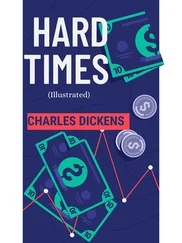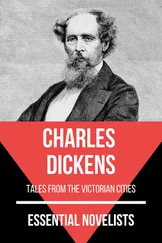In truth, Mrs. Gradgrind's stock of facts in general was woefully defective; but Mr. Gradgrind in raising her to her high matrimonial position, had been influenced by two reasons. Firstly, she was most satisfactory as a question of figures; and, secondly, she had “no nonsense” about her. By nonsense he meant fancy; and truly it is probable she was as free from any alloy of that nature, as any human being not arrived at the perfection of an absolute idiot, ever was.
The simple circumstance of being left alone with her husband and Mr. Bounderby, was sufficient to stun this admirable lady again without collision between herself and any other fact. So, she once more died away, and nobody minded her.
“Bounderby,” said Mr. Gradgrind, drawing a chair to the fireside, “you are always so interested in my young people—particularly in Louisa—that I make no apology for saying to you, I am very much vexed by this discovery. I have systematically devoted myself (as you know) to the education of the reason of my family. The reason is (as you know) the only faculty to which education should be addressed. “And yet, Bounderby, it would appear from this unexpected circumstance of to-day, though in itself a trifling one, as if something had crept into Thomas's and Louisa's minds which is—or rather, which is not—I don't know that I can express myself better than by saying—which has never been intended to be developed, and in which their reason has no part.”
“There certainly is no reason in looking with interest at a parcel of vagabonds,” returned Bounderby. “When I was a vagabond myself, nobody looked with any interest at me; I know that.”
“Then comes the question; said the eminently practical father, with his eyes on the fire, “in what has this vulgar curiosity its rise?”
“I'll tell you in what. In idle imagination.”
“I hope not,” said the eminently practical; “I confess, however, that the misgiving has crossed me on my way home.”
“In idle imagination, Gradgrind,” repeated Bounderby. “A very bad thing for anybody, but a cursed bad thing for a girl like Louisa. I should ask Mrs. Gradgrind's pardon for strong expressions, but that she knows very well I am not a refined character. Whoever expects refinement in me will be disappointed. I hadn't a refined bringing up.”
“Whether,” said Gradgrind, pondering with his hands in his pockets, and his cavernous eyes on the fire, “whether any instructor or servant can have suggested anything? Whether Louisa or Thomas can have been reading anything? Whether, in spite of all precautions, any idle story-book can have got into the house? Because, in minds that have been practically formed by rule and line, from the cradle upwards, this is so curious, so incomprehensible.”
“Stop a bit!” cried Bounderby, who all this time had been standing, as before, on the hearth, bursting at the very furniture of the room with explosive humility. “You have one of those strollers” children in the school.”
“Cecilia Jupe, by name,” said Mr. Gradgrind, with something of a stricken look at his friend.
“Now, stop a bit!” cried Bounderby again. “How did she come there?”
“Why, the fact is, I saw the girl myself, for the first time, only just now. She specially applied here at the house to be admitted, as not regularly belonging to our town, and—yes, you are right, Bounderby, you are right.”
“Now, stop a bit!” cried Bounderby, once more. “Louisa saw her when she came?”
“Louisa certainly did see her, for she mentioned the application to me. But Louisa saw her, I have no doubt, in Mrs. Gradgrind's presence.”
“Pray, Mrs. Gradgrind,” said Bounderby, “what passed?”
“Oh, my poor health!” returned Mrs. Gradgrind. “The girl wanted to come to the school, and Mr. Gradgrind wanted girls to come to the school, and Louisa and Thomas both said that the girl wanted to come, and that Mr. Gradgrind wanted girls to come, and how was it possible to contradict them when such was the fact!”
“Now I tell you what, Gradgrind!” said Mr. Bounderby. “Turn this girl to the right about, and there's an end of it.”
“I am much of your opinion.”
“Do it at once,” said Bounderby, “has always been my motto from a child. When I thought I would run away from my egg-box and my grandmother, I did it at once. Do you the same. Do this at once!”
“Are you walking?” asked his friend. “I have the father's address. Perhaps you would not mind walking to town with me?”
“Not the least in the world,” said Mr. Bounderby, “as long as you do it at once!”
So, Mr. Bounderby threw on his hat—he always threw it on, as expressing a man who had been far too busily employed in making himself, to acquire any fashion of wearing his hat—and with his hands in his pockets, sauntered out into the hall. “I never wear gloves,” it was his custom to say. “I didn't climb up the ladder in them.—Shouldn't be so high up, if I had.”
Being left to saunter in the hall a minute or two while Mr. Gradgrind went up-stairs for the address, he opened the door of the children's study and looked into that serene floor-clothed apartment, which, notwithstanding its book-cases and its cabinets and its variety of learned and philosophical appliances, had much of the genial aspect of a room devoted to hair-cutting. Louisa languidly leaned upon the window looking out, without looking at anything, while young Thomas stood sniffing revengefully at the fire. Adam Smith and Malthus, two younger Gradgrinds, were out at lecture in custody; and little Jane, after manufacturing a good deal of moist pipe-clay on her face with slate-pencil and tears, had fallen asleep over vulgar fractions.
“It's all right now, Louisa: it's all right, young Thomas,” said Mr. Bounderby; “you won't do so any more. I'll answer for it's being all over with father. Well, Louisa, that's worth a kiss, isn't it?”
“You can take one, Mr. Bounderby,” returned Louisa, when she had coldly paused, and slowly walked across the room, and ungraciously raised her cheek towards him, with her face turned away.
“Always my pet; ain't you, Louisa?” said Mr. Bounderby. “Good-bye, Louisa!”
He went his way, but she stood on the same spot, rubbing the cheek he had kissed, with her handkerchief, until it was burning red. She was still doing this, five minutes afterwards.
“What are you about, Loo?” her brother sulkily remonstrated. “You'll rub a hole in your face.”
“You may cut the piece out with your penknife if you like, Tom. I wouldn't cry!”
COKETOWN, to which Messrs. Bounderby and Gradgrind now walked, was a triumph of fact; it had no greater taint of fancy in it than Mrs. Gradgrind herself. Let us strike the key-note, Coketown, before pursuing our tune.
It was a town of red brick, or of brick that would have been red if the smoke and ashes had allowed it; but as matters stood, it was a town of unnatural red and black like the painted face of a savage. It was a town of machinery and tall chimneys, out of which interminable serpents of smoke trailed themselves for ever and ever, and never got uncoiled. It had a black canal in it, and a river that ran purple with ill-smelling dye, and vast piles of building full of windows where there was a rattling and a trembling all day long, and where the piston of the steam-engine worked monotonously up and down, like the head of an elephant in a state of melancholy madness. It contained several large streets all very like one another, and many small streets still more like one another, inhabited by people equally like one another, who all went in and out at the same hours, with the same sound upon the same pavements, to do the same work, and to whom every day was the same as yesterday and to-morrow, and every year the counterpart of the last and the next.
Читать дальше
Конец ознакомительного отрывка
Купить книгу












